If you aren't aware of Burt,
he's got a rich voice that brings to mind the
vocals of Bill Withers, while also being a very
fine guitarist and harmonica player. There are a
lot of different styles that go into Burt's
music, all weaving together into a cohesive and
delightful mix.
On a more positive note, Burt
shows off his magnificent voice on the up-tempo
"I'm Busting Out," with strong blues guitar
throughout the song as he sings about how he
needs to get out of this town. Burt shows off
both his harmonica prowess and vocal range on
the funky "Should Have Never Left Me Alone."
Burt mixes multiple musical
styles on the slow tribute to his woman,
"Purdy Lil Thing," kind of a soulful country
thing with strong country rock guitar riffs.
Another example of Burt's outstanding singing is
when he packs a lot of anger and torture into
his voice on the slow blues "Same Old Thing,"
and Burt shows his softer side with the love
song, "Something Special About You."
Both the opening and closing
cuts are strong blues numbers, with Burt playing
more of a muddied harp sound on the beginning
tune, "I Aint' Got No Problem With It," and
pumping plenty of energy into his voice on the
closer, "Got To Make A Change," while also
featuring some really nice slide guitar on this
slow blues.
We get one of the album's better
cuts right from the start with the quirky blues,
"Revolves Around You." It's funky with plenty of
effects on Jones' blues guitar riffs. He follows
with his own kind of love song, a tribute to his
roots in rural Maryland where he learned to
appreciate music. It's a slow blues with a
strong guitar intro leading into his passionate
vocals on "I Love The Blues," with strong B-3
from guest Bennett Paysinger joining in. I'm
right with Jones as he laments the fact that way
too many people in our society just do what
they're told instead of thinking for themselves
on the rockin' blues, "Like Sheep." Kind of
sounds like our current political environment,
right?
Jones proclaims that he's not
fearing the "other man" on "Front Door Man," an
up-tempo blues mover in which he tells us that
he's not going to sneak around to the back door.
Instead, he's at the front door asking where he
can park his Cadillac. Michael Turner and
Allison August join the group with sweet harmony
vocals on the pleasant R&B love song, "Nothin'
On You," before Jones gets topical (and
tropical) on the reggae-ish "I Hate Hate."
We get a couple more special
guests on the heavy slow blues, "I'm Not," with
Jason Freeman's B-3 complementing Jones' guitar
work. Closing the album is an up-tempo blues
rocker, "Burn The Plantation Down," with Jones
taking us on a frantic ride through his tortured
soul.
I'm way overdue in checking out
the complete discography of Dennis Jones, but
for now Soft Hard & Loud will keep me
busy while I listen to it over and over. This
one's a keeper.
In addition to Harpe's
outstanding guitar picking, what really stands
out is her vocals that naturally contain a
smidgen of sass. Both attributes can be heard on
the opening cut, the original "All Night Long,"
made even better with Harpe's outstanding slide
work and the background vocals that she added.
"Hard Luck Woman" stands out for Countryman's
steady walking bass line behind Harpe's
exquisite guitar picking. Harpe clones herself
to harmonize with her own vocals on "Meet Me In
The Middle." Some nice mixing and mastering
after the fact.
The first cover song we hear is
a simply wonderful version of Sippie Wallace's
"Women Be Wise." We've heard many other versions
of this song but Harpe's rendition stands up to
any of them, especially as she takes her guitar
picking to another level as well as adding kazoo
accompaniment. Ms. Wallace would be pleased. The
traditional "Rollin' and Tumblin'" also gets a
good play, with Harpe putting just a bit more
strength behind her vocals and throwing in a
killer slide guitar solo mid-tune. It's hard to
pick any one cut on this album as being better
than the rest, but "Rollin' and Tumblin'" might
be the choice.
Harpe takes it down to the river
side for a spiritually-cleansing version of the
traditional "When I Lay My Burden Down," a
slower number that has the same basic structure
and sound of "Will The Circle Be Unbroken." We
hear more gospel-style vocals on the closing
number, the original "One Fine Day," but it's
the resonant tone Harpe gets from her guitar (à
la Taj Mahal) that makes a definitive closing
statement to this gem of an album.
Erin Harpe has recorded multiple
other very strong albums and all are worth
checking out. But this more stripped-down set
that obviously comes from the heart is now my
new favorite. Meet Me In The Middle will
rank as one of the best in this crazy 2020 year.
Miraglia plays solo on a few of
the cuts, with just her rich vocals and very
nice acoustic guitar picking, while adding a
partner to form a duo on the others. Most
interesting is her use of Lawrence Scudder on
viola on four songs to give those numbers a real
ol' timey vibe. Especially effective is a
version of the classic "C.C. Rider," with
Scudder making good use of his solo time, and on
the Miraglia original, "Pick Up The Gun," with
her feisty vocals and adept fingerpicking
standing out.
Obviously a Bob Dylan fan,
Miraglia covers two of his tunes: "You're Gonna
Make Me Lonesome When You Go," with strong slide
guitar from Peter Parcek, and the slow, rhythmic
"Meet Me In The Morning," featuring Richard
Rosenblatt on harmonica. Parcek returns for more
slide solos on Keb' Mo's "You Can Love
Yourself."
Other classic blues numbers
getting a breath of fresh air from Miraglia
include Janis Joplin's "Turtle Blues," Tampa
Red's "When Things Go Wrong (It Hurts Me Too),"
on which her vocals show more range, and Robert
Johnson's "Walkin' Blues." Miraglia closes the
album with the title cut, a motivational song
written by Tom Bianchi on which she proclaims
that the world needs bright shining stars, super
heroes to lead us on, goodness to be grown, and
that we need to give this shining star a new
home.
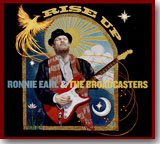 Ronnie Earl and
the Broadcasters - Rise Up. We call
him “Roomful Ronnie” due to his part in the
formation of the group “Roomful of Blues” back
in the day, which has gone thru many
incarnations and lead vocalists, and is
apparently still going out there.
Ronnie Earl and
the Broadcasters - Rise Up. We call
him “Roomful Ronnie” due to his part in the
formation of the group “Roomful of Blues” back
in the day, which has gone thru many
incarnations and lead vocalists, and is
apparently still going out there.
For this new release
on Stony Plain Records, Diane Blue is
vocalist. Ronnie has always specialized in
instrumental music, usually slow in tempo with
organ backing, not being a vocalist himself. We
do hear him reciting thoughts over the slow
blues “Black Lives Matter,” and hear him address
live audiences, as about half the selections are
on this release.
Most of the studio
tracks oddly don’t even contain guitar solos,
giving all the space to the talented keyboardist
Dave Limina. This formula can get old pretty
fast, and past Earl releases have provided
variety in tempo and instrumentation to break it
up. But here it sounds a lot like drawn-out
jamming with no arrangements or even said lyrics
on the female vocal numbers, as if just winging
it, eating up the clock. Masters are able to
get away with this in live performance, but for
a permanent recorded document we’d like a little
more focus on variety.
--- Tom Coulson
 Kid Ramos & Bob
Corritore (backing various vocalists) -
Phoenix Blues Sessions. Re-released and many
previously unreleased bonus tracks from the late
1990s and early 2000s. Kid Ramos, the fabulous
blues guitarist usually associated with the west
coast, is on every track.
Kid Ramos & Bob
Corritore (backing various vocalists) -
Phoenix Blues Sessions. Re-released and many
previously unreleased bonus tracks from the late
1990s and early 2000s. Kid Ramos, the fabulous
blues guitarist usually associated with the west
coast, is on every track.
We especially like
and appreciate the Nappy Brown feature, for
example, “Baby Don’t You Tear My
Clothes.” Credit must be given to harmonica man
and producer Corritore for achieving excellent
and authentic blues, in the traditional sense
all around, from the studio audio to the getting
the highest inspiration out of his front folks.
Many of these veterans are late greats, or
surviving elder statesmen of the blues who could
often use a little encouragement and inspiration
for the right energy.
Up next to other new
blues releases of today, BC discs like this
sparkle in comparison. A challenge of not being
a front person or vocalist is how to well
integrate into every track, which the harmonica
man does very well. Other musicians and
vocalists from among the many include: Chico
Chism, Henry Gray, Chief Schabuttie Gilliame,
Big Pete Pearson, Dr. Fish, Johnny Kapp, Paul
Thomas and Mario Moreno.
--- Tom Coulson
Bettye Lavette
- Blackbirds. A decade or so ago I’d have
compared her voice to Ann Peebles and Tina
Turner. Today, Bettye’s voice has seasoned more
into the raspy and tangy Ruth Brown range and
territory. Bettye never goes above a medium
tempo on Blackbirds, in addition a lot of
the lyrical content is a downer. But there’s a
place for music like this, and Bettye has paid
her dues, now is her time. And I appreciate the
absence of unforeseen profanity jumping out of
any track this release, as has happened at least
once before.
--- Tom Coulson
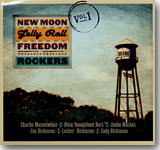 New Moon Jelly
Roll Freedom Rockers-Vol. 1. Blues releases
these days tend to fall into one of about three
categories: an almost perfect recreation of the
sound of 1940s & '50s masters, right down to the
audio (as many European roots/rock/honky tonk
groups do); a bright, pristine and open sound,
sometimes with a piano or second guitar
providing the bass parts without even the need
for that instrument, or a flat-out “Vaughn-a-be”
garage band sound, proving a group, singer or
artist may have grown up with plenty of rock,
but still obviously clueless about the blues.
New Moon Jelly
Roll Freedom Rockers-Vol. 1. Blues releases
these days tend to fall into one of about three
categories: an almost perfect recreation of the
sound of 1940s & '50s masters, right down to the
audio (as many European roots/rock/honky tonk
groups do); a bright, pristine and open sound,
sometimes with a piano or second guitar
providing the bass parts without even the need
for that instrument, or a flat-out “Vaughn-a-be”
garage band sound, proving a group, singer or
artist may have grown up with plenty of rock,
but still obviously clueless about the blues.
This release belongs
in the middle category, recorded in a
Mississippi studio specializing in that sound,
played by veterans as well as younger players
who grew up fairly near that territory. You can
almost hear the style in your head just by
looking at the list of participants: Charlie
Musselwhite, Alvin Youngblood Hart, Jimbo Mathus,
the late Jim Dickinson, and North Mississippi
Allstars members Luther Dickinson and Cody
Dickinson.
--- Tom Coulson
Quick spins, rapid
fire: Six “blues” singles were sent to us from
the UK for review, all from longer album
releases. Very few of them remotely simulate
the blues style, others flat-out don’t belong in
the category. If there’s no comment, the record
goes into file 13. Artists and single titles
are: Elles Bailey “Don't Let The Green
Grass Fool You,” Mick Wynne “You Are The
Message,” Archie Brown & The Young Bucks
“Lonesomeville,” one which stands out a little,
an attractive melody reminding me of Classics IV
“Stormy,” giving it pop radio potential. Ben
Hemming “Say You Will.” Adam Sweet
“Trouble” sounds like a Kenny Wayne Shepherd
wanna-be, and when you’re imitating an imitator,
that’s most often a problem. Angela Lewis
Brown “Better Man” is a FABULOUS example of
a lady who never should attempt singing of any
kind. Top it off, her guitarist’s skill is is
garage band or jam session quality at best. I’m
keeping that one in case I ever need to play a
snippet of how not to even try music.
--- Tom Coulson
2019 jazz releases, by “Desert Doug”
Miers, guest reviewer for Full Moon Hacksaw LLC:
Andrea Superstein -
Worlds Apart. Mostly original tunes with
some covers. Nice club voice but doesn’t emote
much. Better suited for live performance than
disc. Solid if somewhat dated arrangements.
Erik Applegate -
Woodstock. I didn’t think I was going to
like this but I did. Reminded me of Steely
Dan. I would have so mixed it differently. Pop
with a modern non-bop slant. One track
completely doesn’t fit, another is like from a
whole different band.
Baritone Madness. Yup,
that’s what it is. Three bari saxes backed by
bass and drums.I don’t know what a baritone sax
is supposed to sound like outside of its usual
place in a horn section, but on these tracks it
ranged from pretty sweet and mellow to
cartoonish (like a cheap synth). None of the
tunes allow (by design I’m sure) the players to
play to type.
George Coleman -
The Quartet. Saxophonist/Leader Coleman and
pianist Harold Mabern have played together and
it shows. Drummer Joe Farnsworth adds all the
energy and spark you could ask for. Great tone
and feel all around. Well-engineered and mixed.
Reissue late 1950s Miles
Davis on Prestige, “Bluing” (Blue in G)?
All jazz blues selections at various tempo and
feel from bop to cool. Top sidemen.
—Tom Coulson
I play on the air what I review in print,
fullmoonhacksaw.com
Listen to our re-booted one-hour weekly radio
series “Blues Radio"
 The two-disc live set, Traveling Man (NorthernBlues
Music), captures the venerable Watermelon
Slim at his absolute best, performing solo
at two separate Oklahoma venues (The Blue Door
in Oklahoma City and The Depot in Norman) back
in 2016. Always a compelling performer, he is
doubly so in a solo setting where his
outstanding slide and bottleneck guitar work and
captivating vocals are front and center. The 17
songs over the two sets are a mix of Slim’s
interpretations of classic blues songs along
with own unique originals that blend seamlessly
with the standards.
The two-disc live set, Traveling Man (NorthernBlues
Music), captures the venerable Watermelon
Slim at his absolute best, performing solo
at two separate Oklahoma venues (The Blue Door
in Oklahoma City and The Depot in Norman) back
in 2016. Always a compelling performer, he is
doubly so in a solo setting where his
outstanding slide and bottleneck guitar work and
captivating vocals are front and center. The 17
songs over the two sets are a mix of Slim’s
interpretations of classic blues songs along
with own unique originals that blend seamlessly
with the standards.
The first set,
recorded at The Blue Door in September of 2016,
included 11 songs, including several written by
Slim that vividly describe his days as a truck
driver. “Blue Freightliner” offers some great
slide guitar work, and the country-flavored
“Truck Driving Songs” is a real crowd pleaser.
“Scalemaster Blues,” the reflective “300 Miles,”
and Mississippi Fred McDowell’s “Highway Blues”
(a.k.a. “Highway 61 Blues”) gets the Watermelon
Slim treatment. The new song, “Northern Blues,”
describes winter in New England, and “The Last
Blues” frankly recounts Slim’s near-fatal heart
attack and its aftermath.
Slim covers
another McDowell tune on this set, the lively
“Frisco Line,” as well as an interesting medley
that combines Howlin’ Wolf’s “Smokestack
Lightning” and Muddy Waters’ “Two Trains
Running,” picking up the harmonica for “Jimmy
Bell,” written by folk blues singer William
Carridine (a.k.a. Cat-Iron). The set closes with
a version of “Holler #4,” previously heard a
capella style on Slim’s Church Of The Blues
album. This version adds tasty slide guitar to
the mix.
The second
set, from The Depot, was recorded in February of
2016 and the run-time is about half of the first
set, but the seven songs include six Slim
compositions and the songs are taken at a
slightly brisker pace for the most part. “Let It
Be In Memphis” is greasy and funky, like the
city itself, and the up-tempo “Into The Sunset”
goes full country & western. Next, Slim
enthusiastically covers the folk classic, “John
Henry,” for the first time on disc (it’s been a
favorite at his shows for a long time). His
“Archetypal Blues” gives a shout out to an
impressive list of blues men who have influenced
him over the years and he plays the guitar
fiercely on this track.
“Oklahoma
Blues,” written over 30 years ago, honors Slim’s
adopted home state. The harrowing “Devil’s
Cadillac” retells the tale of the Crossroads
(riding shotgun with the devil) and dates back
to his days playing with The Workers. The final
cut on this set is “Dark Genius,” a political
song with a verse about John F. Kennedy and one
about Anwar Sadat, and Slim himself --- the
things that they did, what each stood up for,
and what might have been.
Both sets show
that Watermelon Slim is one of the most
interesting and truly unique blues and roots
performers currently practicing, capable of
captivating an audience with just his voice and
guitar. Traveling Man is a great
introduction to his talents and deserves to be
heard.
---
Graham Clarke
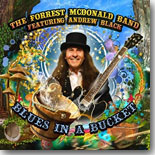 Forrest
McDonald and band return for his 15th
release, Blues In A Bucket (World Talent
Records), a dynamite effort featuring 11 brand
new original songs with McDonald sounding as
great as ever on guitar, backed by a superlative
set of musicians including lead vocalist Andrew
Black and guest vocalist Becky Wright. McDonald
has been playing the blues for nearly six
decades and his nimble, versatile guitar work
and superb songwriting skills are on full
display.
Forrest
McDonald and band return for his 15th
release, Blues In A Bucket (World Talent
Records), a dynamite effort featuring 11 brand
new original songs with McDonald sounding as
great as ever on guitar, backed by a superlative
set of musicians including lead vocalist Andrew
Black and guest vocalist Becky Wright. McDonald
has been playing the blues for nearly six
decades and his nimble, versatile guitar work
and superb songwriting skills are on full
display.
The opener,
“Boogie Me Till I Drop,” has a lively Crescent
City feel that gets the disc off to a great
start. “Blues In The Basement” is a sweet slow
burner that really takes its time and allows
McDonald (on guitar) and Black (behind the mic)
ample space to shine. The title track is a funky
blues rock shuffle that puts a positive spin on
the blues, and the moving “Blue Morning Sun” is
a tribute to McDonald’s brother Steve (to whom
the album is dedicated), who succumbed to cancer
in early 2019.
“Hard To Lose”
is a gritty, soulful blues with impassioned
guitar and vocals, and “Windy City Blues” is a
splendid slow blues. The inspirational “Go To
The Light” offers counsel for those at the end
of their earthly journey, and “Misery and Blues”
is another slow blues. Black and McDonald handle
these slow burners very well, and this one may
be the best of the album. The ominous swamp
blues “Powerhouse” features guest vocalist
Wright and Pix Ensign on harmonica, while “Going
Back To Memphis” sounds like a good old greasy,
funky time in the Bluff City.
The jubilant
closing track, “Let The Love In Your Heart,”
strikes a funky second-line groove as Wright and
McDonald trade vocals backed by horns and
harmonica.
Sounds like
Forrest McDonald’s 15th album just might be his
best with his usual excellent guitar work and
songwriting, combined with some incredibly
talented musicians. Blues In A Bucket
will definitely put a hop in your step.
---
Graham Clarke
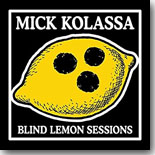 Blind Lemon
Sessions (Endless Blues Records) came to be
when Mick Kolassa was asked by Thomas
Schleiken (of Blind Lemon Records) to perform at
a few shows in Germany and to record a couple of
tracks for a compilation album. A couple of
songs turned into three albums: the compilation
for Blind Lemon Records, a future ukelele
compilation album (Kolassa also plays ukelele
and banjolele), and Blind Lemon Sessions,
a dozen tracks mixing original tunes with some
of Kolassa’s favorite traditional blues songs.
Blind Lemon
Sessions (Endless Blues Records) came to be
when Mick Kolassa was asked by Thomas
Schleiken (of Blind Lemon Records) to perform at
a few shows in Germany and to record a couple of
tracks for a compilation album. A couple of
songs turned into three albums: the compilation
for Blind Lemon Records, a future ukelele
compilation album (Kolassa also plays ukelele
and banjolele), and Blind Lemon Sessions,
a dozen tracks mixing original tunes with some
of Kolassa’s favorite traditional blues songs.
Kolassa kicks
off the album with a lively read of Lonnie
Johnson’s “Jelly Roll Baker,” his warm vocal and
guitar balanced by Eric Hughes’ sprightly
harmonica. His original “Text Me Baby” is a
humorous blues take on a modern subject,
featuring violin from Alice Hasen. The cheery
“Keep On Truckin’” features Hasen’s violin and
Kolassa on banjolele, as does “I Want To Be
Seduced,” a fun, good-natured tune written by
Gary Tigerman. “Mr. Right” is a throwback to the
bawdy, sexual innuendo-laden tunes from the
pre-war era, and “Bad Things” (Jace Everett’s
theme for the series True Blood) follows suit,
albeit with a more ominous tone.
Taj Mahal’s
“Cakewalk Into Town” is always a ball to hear,
and judging from Kolassa’s performance it’s a
ball to sing and play, too. He does a great job
on the traditional “St. James Infirmary,”
breathing new life into the oft-covered classic,
and Blind Blake’s “Ditty Wah Ditty” is a lot of
fun in his hands, too. “Recycle Me” is another
humorous blues that puts a modern spin on a
traditional blues topic.
A few years
ago, Kolassa and Mark Telesca did an entire
album of Beatles covers (You Can’t Do That),
and he presents another Lennon/McCartney classic
on this album, “Help,” that really works in a
blues context. The album concludes with
Kolassa’s “The Space Between Us,” a brief,
poignant tune about the end of a relationship.
Blind Lemon
Sessions is a light, relaxing set of
acoustic blues originals and covers, just like
we’ve come to expect from Mick Kolassa on a
regular basis. Each subsequent album I hear from
him becomes my favorite Mick Kolassa album, and
this one is no exception.
---
Graham Clarke
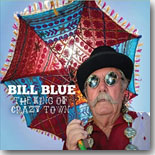 A chance
meeting with Arthur “Big Boy” Crudup
triggered Bill Blue’s passion for the blues. He
picked up guitar as a youth, developing a potent
slide guitar technique. He honed his skills
further when Crudup asked him to help assemble a
band on the heels of the British music invasion
and the reignited interest in the blues in the
U.S. Blue and Crudup toured the country, opening
for Bonnie Raitt on her first American tour.
A chance
meeting with Arthur “Big Boy” Crudup
triggered Bill Blue’s passion for the blues. He
picked up guitar as a youth, developing a potent
slide guitar technique. He honed his skills
further when Crudup asked him to help assemble a
band on the heels of the British music invasion
and the reignited interest in the blues in the
U.S. Blue and Crudup toured the country, opening
for Bonnie Raitt on her first American tour.
When Crudup
died in 1974, Blue went out on his own,
releasing a couple of albums for the Adelphi
label and touring all over the world. In the
’80s, he tired of the road and moved to Key West
where he didn’t record for a quarter century,
though he continued playing occasionally. In
2013 he met British producer Ian Shaw, who
persuaded him to return to the studio, where he
subsequently released the well-received
Mojolation. Seven years later, he returns
with his follow-up, The King of Crazy Town
(Conch Town Music), a power-packed 11-song set
which features ten new songs written or
co-written by Blue.
The opener,
“Do What I Say Don’t Do What I Do,” is a
fast-paced blues rocker with a shimmering,
psychedelic edge. The swamp-flavored “Carolina
Time” is a tune about Blue’s home state, and “I
Want It All” is a rollicking, horn-fueled read
of the Eddie Hinton tune. “Everybody’s Leaving
Town” is a somber acoustic tune featuring Blue
on Resonator. “Hunker Down” is a Delta boogie
“hurricane song” that perfectly captures the
tension that Key West residents doubtlessly face
every time a new storm heads their way, while
the title track is a funky rocker.
“Indianola” is
Blue’s heartfelt tribute to B.B. King, who
offered the young Blue encouragement when he was
starting out on his own, and on the soulful
rocker, “You Ain’t Fun Anymore,” Blue is joined
by Matt Backer on vocals. The moody,
Latin-tinged “Enough Blues To Give You The
Blues” features some superb slide guitar from
Blue, and “Closing Time” is a sultry, soul
burner that aptly describes the mood at that
particular time of the night.
The disc
closes with the instrumental “Mojolation,” which
gives Blue more space to shine on searing slide
guitar backed by those wonderful horns featured
throughout the disc.
The King of
Crazy Town will certainly excite fans of
energetic blues, rock, and soul. Hopefully, Bill
Blue with tighten the gap a bit between
releases, because this particular effort leaves
you wanting more.
---
Graham Clarke
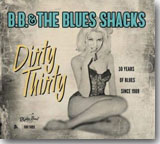 The second
thing you notice on the cover of B.B. & The
Blues Shacks’ latest effort, Dirty Thirty
(Rhythm Bomb Records), is the statement “30
years of blues since 1989.” It’s hard to believe
that the world class German band has been
plugging away for that long, but it’s the honest
truth. The band has racked up numerous honors
over the years, played over 3,000 gigs, and
released a dozen albums. Andreas Arlt (guitar)
and Michael Arlt (vocals, harmonica) have been
with the band since the beginning and are joined
by bassist Henning Hauerken (member since 1996),
drummer Andre Werkmeister (2014), and
keyboardist Fabian Fritz (2015).
The second
thing you notice on the cover of B.B. & The
Blues Shacks’ latest effort, Dirty Thirty
(Rhythm Bomb Records), is the statement “30
years of blues since 1989.” It’s hard to believe
that the world class German band has been
plugging away for that long, but it’s the honest
truth. The band has racked up numerous honors
over the years, played over 3,000 gigs, and
released a dozen albums. Andreas Arlt (guitar)
and Michael Arlt (vocals, harmonica) have been
with the band since the beginning and are joined
by bassist Henning Hauerken (member since 1996),
drummer Andre Werkmeister (2014), and
keyboardist Fabian Fritz (2015).
Dirty
Thirty consists of 16 original tracks with
four brand new tunes intertwined with a dozen
remakes of the band’s classic repertoire. As
always, the band tears through vintage blues and
R&B of the Chicago, New Orleans, Memphis, and
West Coast varieties. “Death Tax” is a greasy
shuffle, while “Ramblin’ Kind” and “Three Handed
Woman” shifts to the Windy City, and “I Run To
You” and “Moonshine Blues” both swing in fine
West Coast fashion.
“Not The One
For Me” is an old school rocker, “It Takes Time”
is a easy-going shuffle, and “Ain’t Gonna Cry No
More” ventures to the Crescent City keyed
(sorry) by some great Fess-influenced piano work
from Fritz, who also shines on the jazzy
instrumental “Crime Time” on B3.
Dirty
Thirty comes as a single CD or packaged as
part of a three-CD set that reissues two of the
band’s best previous efforts, 2012’s Come
Along and 2014’s Businessmen. Each
album includes a bonus cut not on the original
CD: Come Along features a slick live
version of Johnny Guitar Watson’s “She Moves
Me,” and Businessmen offers a live take
of the 1942 classic “Deep in The Heart of
Texas.”
Simply put, if
you dig Dirty Thirty on it’s own, you
will love the other two discs, so spring for the
total package. 49 songs in all and not a bad one
in the bunch. If you’re late to the game
regarding B.B. & The Blues Shacks, this is the
perfect opportunity to get on board with both
feet.
---
Graham Clarke
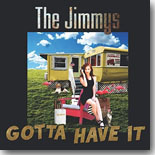 One of the
more impressive groups I’ve heard in the last
five or so years has been The Jimmys, a
Wisconsin-based band (Jimmy Voegeli –
vocals/keys, Perry Weber – vocals/guitar,
Peterson Ross – saxophone, and John Wartenweiler
– bass) that mix blues, rock, and R&B into their
sound. Their latest effort, Gotta Have It
(Brown Cow Productions), is my favorite of the
lot, with 13 tracks (11 originals) produced by
Tony Braunagel (who also played drums) and
featuring Marcia Ball on a pair of tracks.
One of the
more impressive groups I’ve heard in the last
five or so years has been The Jimmys, a
Wisconsin-based band (Jimmy Voegeli –
vocals/keys, Perry Weber – vocals/guitar,
Peterson Ross – saxophone, and John Wartenweiler
– bass) that mix blues, rock, and R&B into their
sound. Their latest effort, Gotta Have It
(Brown Cow Productions), is my favorite of the
lot, with 13 tracks (11 originals) produced by
Tony Braunagel (who also played drums) and
featuring Marcia Ball on a pair of tracks.
The band jumps
right out of the gate with “Ain’t Seen Nothin’
Yet,” a boogie woogie rocker powered by a punchy
horn section, while “Grim Reaper” is a mid-tempo
R&B groover. Ms. Ball co-wrote the amusing
“Write A Hit” with Voegeli and Braunagel, adding
Crescent City-flavored keyboards and sharing
lead vocals with Voegeli.
The swinging
title track “She’s Gotta Have It” is a keeper as
well, describing a high maintenance lady, and
“Started Up Again” has a funky swamp blues vibe
that works very well. “Hotel Stebbins” brings
the horn section back in a big way and the band
digs in deep, and “Drinkin’ is an easy rolling
blues shuffle.
Ms. Ball
returns on “When You Got Love,” with piano and
backing vocals. Gary Koch adds tasty slide
guitar on this track, too. The album’s only
cover is next, Gary Nicholson and Kevin
McKendree’s jaunty “Always A Woman,” followed by
the funky cautionary tale, “Words And Actions.”
The splendid slow burner, “Someday Baby” (penned
by fellow Wisconsinite Jim Liban), offers Weber
an opportunity to stretch out on guitar.
Closing the
disc is “Take You Back,” a classy urban blues,
and “Jose,” a greasy Memphis-styled instrumental
tribute to the band’s favorite beverage.
The Jimmys
have been making mighty fine music for over 12
years, and hopefully Gotta Have It will
be the album that gets them the recognition and
accolades that they deserve.
---
Graham Clarke
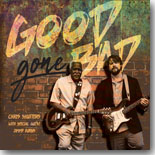 Ohio guitarist
Chris Shutters has known Chicago
soul/blues legend Jimmy Burns for over a decade,
having met at an open mic night at Buddy Guy’s
Legends club that was hosted by Burns. They
played a couple of songs together that night,
and the rest, as they say, is history. In the
meantime, Shutters has released several top
notch recordings, as has Burns, but the two
decided to put their talents together with Burns
serving as “special guest” on Shutters’
wonderful new release Good Gone Bad
(Third Street Cigar Records). The album features
ten tracks, seven written by Shutters and three
from Burns.
Ohio guitarist
Chris Shutters has known Chicago
soul/blues legend Jimmy Burns for over a decade,
having met at an open mic night at Buddy Guy’s
Legends club that was hosted by Burns. They
played a couple of songs together that night,
and the rest, as they say, is history. In the
meantime, Shutters has released several top
notch recordings, as has Burns, but the two
decided to put their talents together with Burns
serving as “special guest” on Shutters’
wonderful new release Good Gone Bad
(Third Street Cigar Records). The album features
ten tracks, seven written by Shutters and three
from Burns.
Both artists
share vocals and guitar duties throughout. The
rowdy title track opens the disc, with the duo
joined by Rick Warner of Rare Earth on keys. The
funky shuffle, “Stop The Train,” is a Burns
original originally heard on his 2003 Delmark
release, Back To The Delta. Burns and
Shutters complement each other well on guitar.
“Can’t Play The Blues Like B.B.” is a
good-natured tune that describes a meeting
between Shutters and the King of the Blues, and
“Miss Annie Lou” was a standout track on Burns’
1996 Delmark debut, Leaving Here Walking,
taken at slightly livelier pace with sinewy
guitar work from Shutters, while Shutters’
“Unwind” mixes blues rock with pop.
Shutters also
wrote “Poor Boy Blue,” a country blues sung
soulfully by Burns that mixes acoustic and
electric guitar work. The fiery “Living In A
Dream” is a hard-charging rocker loaded with
wah-wah guitar, and the upbeat blues “Keep You
Satisfied” keeps the blue rock feel going
strong. Burns’ last composition contribution is
“No Consideration,” from his 1999 Delmark effort
Night Time Again. Burns and Shutters
(with an assist from harmonica player Mark
Shutters) take the intensity down a notch from
the original version, giving this one more of a
laidback vibe that works really well. The
closer, “The Book Of Life,” mixes pop, rock, and
a little bit of country.
Chris Shutters
and Jimmy Burns come at the blues from different
directions, but both artists are able to put
those differences aside with each playing off
the other well, both vocally and instrumentally.
Obviously both come out of their comfort zone a
little bit on several of the tracks, but it all
works marvelously well. Hopefully, Good Gone
Bad won’t be the last time these two
collaborate.
---
Graham Clarke
 Harper and
Midwest Kind’s latest release is Rise Up
(Access Records), a sharp 10-song set of
original tunes that showcases the Australian
singer/songwriter’s deft mix of blues, soul,
funk, and world music to excellent effect.
Harper (vocals, harmonica, didgeridoo,
keyboards, guitar) and his bandmates (Geoff
Michael – guitar, Dan “Ozzie” Anderson – bass,
Jim Pryor – drums/percussion, and Bobbi
Llewellyn – backing vocals, with guest
guitarists Paul Nelson and Brent Baxter Barrett)
has crafted a most memorable album.
Harper and
Midwest Kind’s latest release is Rise Up
(Access Records), a sharp 10-song set of
original tunes that showcases the Australian
singer/songwriter’s deft mix of blues, soul,
funk, and world music to excellent effect.
Harper (vocals, harmonica, didgeridoo,
keyboards, guitar) and his bandmates (Geoff
Michael – guitar, Dan “Ozzie” Anderson – bass,
Jim Pryor – drums/percussion, and Bobbi
Llewellyn – backing vocals, with guest
guitarists Paul Nelson and Brent Baxter Barrett)
has crafted a most memorable album.
The haunting
sound of the didgeridoo kicks off the title
track, which opens the disc with a hypnotic
rhythm and an encouraging call to improve things
around you. “Blues I Can’t Use” has a hill
country feel and features guitarist Nelson’s
soaring fretwork, and “I Still Got You”
describes love enduring through tough times,
punctuated by Harper’s splendid harp work. The
dark “Hateful” brings back the didgeridoo, and
pointedly talks about, well, hate, while “Heavy
Horses” features a neat guitar riff from Michael
and a wonderfully soulful duet between Harper
and Llewellyn, plus a fine harmonica solo from
Harper.
The midtempo
“Talk To Me” has a rock-pop flavor that’s a good
fit, and “World’s Insane” takes a frank look at
the current state of the world and the need for
improvement. “Welcome Home” is a funky rocker
with a buoyant rhythm that plays well with
Harper’s harmonica, and the somber “Let You Go”
bumps along briskly, driven by Anderson’s bass
and Pryor’s drumming. “Peaceful,” the album
closer, is an acoustic track that leans toward
jazz and wraps things up nicely.
Rise Up
is a solid piece of work with provocative
songwriting and musicianship not typically found
on your basic blues album. To these ears, Harper
is an underrated performer, vocally and
instrumentally, as well as a fine songwriter who
turns out quality release after quality release.
This album ranks with his strongest efforts.
---
Graham Clarke
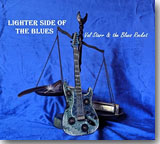 Lighter
Side of the Blues (Sandwich Factory Records)
is the fifth release from California blues
rockers Val Starr & The Blues Rocket, and
it lives up to his title with a baker’s dozen
pleasing and energetic upbeat blues originals.
Starr (vocals/rhythm guitar) is backed by her
husband John Ellis (bass/slide guitar), Timothy
Brisson (lead guitar), Frankie Munz (harmonica),
and Paul Farman (drums), along with guest
artists Todd Morgan (keyboards), Horacio
Socarras (percussion), Danny Sandoval (sax), and
the intriguingly-tagged Saxophone Zot (duh,
sax).
Lighter
Side of the Blues (Sandwich Factory Records)
is the fifth release from California blues
rockers Val Starr & The Blues Rocket, and
it lives up to his title with a baker’s dozen
pleasing and energetic upbeat blues originals.
Starr (vocals/rhythm guitar) is backed by her
husband John Ellis (bass/slide guitar), Timothy
Brisson (lead guitar), Frankie Munz (harmonica),
and Paul Farman (drums), along with guest
artists Todd Morgan (keyboards), Horacio
Socarras (percussion), Danny Sandoval (sax), and
the intriguingly-tagged Saxophone Zot (duh,
sax).
The funky
shuffle “Say Goodbye To The Blues (Like You Mean
It)” opens the disc with a driving rhythm and
twin saxes wailing. “Sactown Heat” keeps up the
funk as it describes the summer heat in
Sacramento. The theme of the Windy City-flavored
“If She Can Get A Man (Anyone Can)” will crack
you up, while the jaunty title track will put a
hop in your step. “All or Nuthin’ Man” is a slow
burner fueled by guest Morgan’s keyboards,
Munz’s harmonica, and Brisson’s lead guitar, and
it’s hard not to smile at the jubillant “Can’t
Get Sad Tonight.”
“Lift A
Finger” is a gritty blues rocker where Starr
grumbles about getting no help around the house.
Her husband Ellis lays down some splendid slide
guitar on this track, so he can be forgiven for
neglecting the chores. Apparently, all is
forgiven, because the next track, “Mister
Bassman,” is a love letter of sorts from Starr
to Ellis (who’s a force of nature on the entire
album) and other bass players.
“Movin’ On” is
a energetic R&B tune with Sandoval chipping in
big on saxophone, and “24 Hour Blues” has a
nice, clean pop sheen. The Jimmy Reed classic
“Big Boss Man (#MeToo)” gets a 21st century
update.On the closing tracks, “Shame On You” and
“The Blues Doesn’t Pick Or Choose,” the band
rocks hard (on the former) and wraps up things
nicely with a lively blues stepper (the latter).
All in all,
Val Starr & The Blues Rocket’s Lighter Side
of the Blues is a fine set of blues and R&B
that will put a smile on your face and some pep
in your step.
---
Graham Clarke
Your humble
correspondent has also received a bevy of blues
singles over the past few weeks. Let’s take a
look at a few of them….
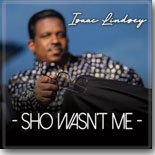 Our friend
Stevie J. Blues has been very busy during the
pandemic, producing and releasing several
singles from several acts in the Jackson,
Mississippi area that are worth a spin (or
whatever one uses to listen to new music these
days). There are three new southern soul singles
from singer Isaac Lindsey, lead vocalist
for the gospel group The Windy City
Spiritualaires. First up is a smooth cover of
Joe Simon’s “The Choking Kind,” and Lindsey does
a fine job with it, balanced by soulful backing
vocals and a tight musical arrangement. Larry
Addison’s “You Got To Hurt Before You Heal” was
one of my favorite tracks from Bobby “Blue”
Bland’s 1989 Midnight Run album, and
Lindsey’s gospel-flavored interpretation is as
good as Bland’s own heartfelt version.
Our friend
Stevie J. Blues has been very busy during the
pandemic, producing and releasing several
singles from several acts in the Jackson,
Mississippi area that are worth a spin (or
whatever one uses to listen to new music these
days). There are three new southern soul singles
from singer Isaac Lindsey, lead vocalist
for the gospel group The Windy City
Spiritualaires. First up is a smooth cover of
Joe Simon’s “The Choking Kind,” and Lindsey does
a fine job with it, balanced by soulful backing
vocals and a tight musical arrangement. Larry
Addison’s “You Got To Hurt Before You Heal” was
one of my favorite tracks from Bobby “Blue”
Bland’s 1989 Midnight Run album, and
Lindsey’s gospel-flavored interpretation is as
good as Bland’s own heartfelt version.
Finally,
Lindsey’s take on Ronnie Lovejoy’s classic,
“Sho’ Wasn’t Me,” is a keeper as well. Lindsey’s
robust vocal comparing favorably to Lovejoy’s
original, as he adds a bit of grit to his
delivery on this track. All three of these
tracks will certainly satisfy southern soul
fans, who will want to hear more from Lindsey,
who has an album in the works as well.
Stevie J.
Blues has also released a funky new single from
Urban Ladder Society (U.L.S.) called
“Take Care Of Each Other,” which combines blues,
funk, hip-hop, and soul in a plea for all of
society to persevere through these turbulent
times.
 Keeping it in
the central Mississippi region, there’s also a
very nice single out from up-and-coming southern
soul singer Shunté, “I Need 2 Know,” an
original composition that has a smooth late
’70s/early ’80s Quiet Storm feel, thanks to the
understated, but funky arrangement backing
Shunté, who has a sweet and soulful voice.
Stevie J. Blues will be recording a duet with
Shunté for release during Valentine’s Day. Great
things are happening in Jackson, Mississippi on
the blues and soul scene.
Keeping it in
the central Mississippi region, there’s also a
very nice single out from up-and-coming southern
soul singer Shunté, “I Need 2 Know,” an
original composition that has a smooth late
’70s/early ’80s Quiet Storm feel, thanks to the
understated, but funky arrangement backing
Shunté, who has a sweet and soulful voice.
Stevie J. Blues will be recording a duet with
Shunté for release during Valentine’s Day. Great
things are happening in Jackson, Mississippi on
the blues and soul scene.
Delmark
Records also recently issued a pair of singles.
The first is “The Ballad of George Floyd,” a
powerful musical statement by guitarist Dave
Specter, with assistance from keyboardist
Brother John Kattke and harmonica master Billy
Branch, describing the death of the Minnesota
resident at the hands of the police back in the
late spring and calls for justice and change in
the country. Specter’s anguished vocal is front
and center with sympathetic backing from Kattke
and Branch, who also provide vocal support.
Music is said to soothe the savage beast, but it
also helps lead to change when done well, and
this is a very effective call.
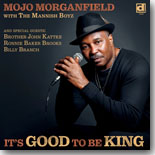 The second
single is a bit more lighthearted, coming from
Muddy Waters’ youngest son, Joseph, a.k.a.
Mojo Morganfield. “It’s Good To Be King” is
a delightful old school Chicago blues number
that features his good-natured vocals backed by
Branch on harmonica, Kattke on keys, Ronnie
Baker Brooks on guitar, and Rick Kreher (Waters’
last guitarist) on rhythm guitar. Morganfield’s
strong and confident vocals bode well for his
recording future and hopefully, Delmark will
reward him with a full album soon.
The second
single is a bit more lighthearted, coming from
Muddy Waters’ youngest son, Joseph, a.k.a.
Mojo Morganfield. “It’s Good To Be King” is
a delightful old school Chicago blues number
that features his good-natured vocals backed by
Branch on harmonica, Kattke on keys, Ronnie
Baker Brooks on guitar, and Rick Kreher (Waters’
last guitarist) on rhythm guitar. Morganfield’s
strong and confident vocals bode well for his
recording future and hopefully, Delmark will
reward him with a full album soon.
The
Starlite-Campbell Band recently issued
another couple of singles from their forthcoming
album, The Language of Curiosity. It’s a
masterful version of the Blind Faith classic,
“Can’t Find My Way Home,” featuring the vocals
of Suzy Starlite and Simon Campbell. Their vocal
harmonies are exquisite and the musical backing
is perfect. A few months back, the band issued
“Lay It Out On Me,” a luscious slow burner with
vocals from Campbell.
Based on the
three tracks heard so far, we reviewed Stone
Cold Crazy in
May of this year, the new album
should be a must-buy for any fan of vintage
British blues. These two tracks capture the feel
of the ’60s British blues recordings very well.
You can check out these singles (and pre-order
the album) at the band’s
website.
---
Graham Clarke